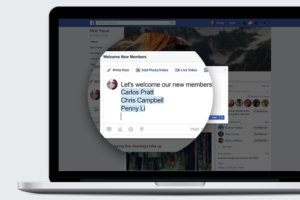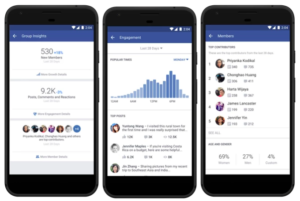
There’s been a lot of coverage about the changes Facebook made in January 2018 and the way its algorithm pays attention to posts from Facebook Groups. For digital marketers, the important thing to remember is that Facebook now assigns a higher priority to Groups than it used to.
The focus on Groups makes good business sense. According to a post by Facebook’s Mark Zuckerberg, more than 100 million people are part of “very meaningful” groups on Facebook. So along with posts from friends and family, Facebook assigns a greater weight to Groups than it does to Pages. Are you up-to-date on the latest buzz around Facebook Groups? Let’s do a quick recap.
Benefits of Facebook Groups versus Pages
First, you might be wondering why you should create a Facebook Group for your business instead of just using your Facebook Page. There are some important differences.
A Facebook Page is a profile of your business, and you should definitely have one. Your Page tells people who you are, what you do, and how to find you. Pages are public, which means anyone can find you and users can follow you simply by clicking “like.” You can easily share information with your fans by regularly posting high-quality content. If your business isn’t on Facebook yet, check out our post about how to create an effective Facebook Page. Pages are straightforward to manage, but the opportunities to engage with fans are limited, which is what Groups can help with.
Facebook Groups help you build a community around your brand by providing more personal engagement. You can create Groups for specific purposes, and you can have more than one. For example, you could have a Group dedicated to providing customer support and another to provide a discussion forum for fans. Groups are more informal, so they feel much less like traditional advertising. In Groups, your fans chat with each other and build online relationships. That means they will visit the Group regularly to check-in with online friends. You can also control who is allowed to join your Group, creating a more intimate community for people to share opinions. That’s something a Page can’t offer.
For a great explanation of the main differences between Facebook Pages and Groups, check out this video.
Groups take more effort to manage, but the rewards can be significant. In fact, some publishers are having great success in using Facebook Groups to create communities for online discussion.
Facebook’s new mission and its focus on Groups
The good news is that Facebook has been introducing new tools to make Groups more relevant and easy to use. In June 2017, the company hosted its first-ever Facebook Communities Summit, where Zuckerberg announced that Facebook updated its mission statement.
Facebook’s mission is now: “To give people the power to build community and bring the world closer together.“
Consistent with the focus on building community, Facebook added several new features to help admins more easily manage Facebook Groups. These improvements will save time, and they make Groups even more valuable for high-quality audience engagement. You can also link your Groups directly to your Page to create a powerful marketing combination.
If you already have a Facebook Group for your business, you can definitely take advantage of these tips. If you don’t have a Facebook Group yet, now is a good time to start one! Not sure how to do create a Facebook Group? Facebook has these easy-to-follow instructions.
New Facebook Group admin tools
So what is new with Facebook Groups? Admins can more easily manage new member requests, something that takes a lot of time if you do each one manually. Admins can now sort and filter requests by location and gender, then group them together to accept or decline them all at once.
Group admins can also write welcome posts that will automatically tag newcomers. Welcome posts are a great way to introduce new members and advise them of any rules or codes of conduct that group members are expected to follow.

As well, admins have new tools to manage difficult conversations in their Groups and delete spammers. Admins can temporarily turn off a member’s ability to comment and post, giving a chance to resolve issues. In addition, when a member violates the community’s rules, admins can use a single click to remove members—and their content—from multiple Groups at the same time.
New Facebook Group Insights
Facebook also launched Group Insights, something that Group admins have been asking to have for a long time. Previously, this information was only available for Pages. Now, Group Insights provides valuable analytical information to admins about how their Groups are growing, who belongs to the Groups, and how often members post and comment. With this information, Group admins can make better decisions about how to engage Group members.

Insights also include data on the days and times when people are most active. The Insights tool even provides targeted tips to help admins make the most of their Group. This means that admins can tailor their social media strategy to optimize the results from Facebook Groups.
New ways of posting to Facebook Groups
Earlier in 2017, Facebook began allowing Pages to post in groups, not just individuals. This means you can be logged in as your business Page and share content and comment on posts. As described by the Social Media Examiner, this allows you to provide advice, assistance and technical support from your official brand account, giving more credibility to your responses.
As well, Facebook now allows you to link to different Groups from your business page, which allows admins to recommend other Group discussions to their members. This creates an opportunity for you to partner with other organizations with interests that are similar to yours, providing added value to your fans.
Building on the Insights data, Facebook also introduced the scheduling tool to Groups, allowing admins to post at times when members are most engaged. That means you can use Postcron to easily schedule Group posts!
Better information for Group members
Facebook also added a feature for member profiles, which makes it easier for people in a Group to learn about each other. When a Group member clicks on another members’ name, a group-specific profile will show information that’s publicly available (based on the users’ privacy settings) and that’s relevant to the specific Group.
Finally, Facebook is using artificial intelligence to recommend more Groups to people—a move intended to increase membership in Groups. This is just another reason for businesses to embrace Facebook Groups as part of your social media and digital marketing plan.
Are you using Facebook Groups as part of your digital marketing strategy? Do you have questions about how Facebook Groups work? Share your thoughts in the comments below!